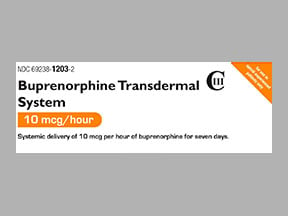
Butrans Coupons & Savings Card – Discount Prices from $68.82
Brand for: Buprenorphine
My prescription
Edit
10MCG/HR, Buprenorphine (4 Patch Weeklies)
Select pharmacy

CVS
$68.82
COUPON PRICE
Walgreens
$134.00
COUPON PRICE
Albertsons
$143.18
COUPON PRICE
Walmart
$258.91
COUPON PRICEButrans savings card
Show this card to your pharmacist
CVS
$68.82
BIN
ID
PCN
GRP
015995
LHKPY243789
GDC
DR33
Powered by
Related opioid agonist/antagonists prescriptions
More prescriptions for pain
Related opioid agonist/antagonists prescriptions
More prescriptions for pain
Price history for Butrans (brand) & Buprenorphine (generic)
4 Patch Weeklies, 10MCG/HR
Average retail price for Butrans
Average retail price for Buprenorphine
Average SaveHealth price for Buprenorphine
Our price history data is based on aggregated prescription data collected from participating pharmacies in America. Our prescription data updates daily to reflect the latest price changes. If you notice a missing data point, it means there wasn't sufficient data available to generate a monetary value for that date.
Over the last 12 months, the average discount price of Butrans is $41.32 using the SaveHealth savings card. That's an average savings of 76.90% on Butrans with our discount card.
*Retail prices are based on pharmacy claims data, and may not be accurate when we don't have enough claims.
Butrans (Buprenorphine) dosage forms
Dosage Quantity Price from Per unit 5MCG/HR 1 Patch Weekly $26.48 $26.48 5MCG/HR 2 Patch Weeklies $34.65 $17.32 5MCG/HR 3 Patch Weeklies $42.83 $14.28 5MCG/HR 4 Patch Weeklies $51.00 $12.75 5MCG/HR 7 Patch Weeklies $75.53 $10.79 7.5MCG/HR 1 Patch Weekly $28.50 $28.50 7.5MCG/HR 2 Patch Weeklies $38.70 $19.35 7.5MCG/HR 3 Patch Weeklies $48.90 $16.30 7.5MCG/HR 7 Patch Weeklies $89.69 $12.81 10MCG/HR 1 Patch Weekly $31.50 $31.50
| Dosage | Quantity | Price from | Per unit |
|---|---|---|---|
| 5MCG/HR | 1 Patch Weekly | $26.48 | $26.48 |
| 5MCG/HR | 2 Patch Weeklies | $34.65 | $17.32 |
| 5MCG/HR | 3 Patch Weeklies | $42.83 | $14.28 |
| 5MCG/HR | 4 Patch Weeklies | $51.00 | $12.75 |
| 5MCG/HR | 7 Patch Weeklies | $75.53 | $10.79 |
| 7.5MCG/HR | 1 Patch Weekly | $28.50 | $28.50 |
| 7.5MCG/HR | 2 Patch Weeklies | $38.70 | $19.35 |
| 7.5MCG/HR | 3 Patch Weeklies | $48.90 | $16.30 |
| 7.5MCG/HR | 7 Patch Weeklies | $89.69 | $12.81 |
| 10MCG/HR | 1 Patch Weekly | $31.50 | $31.50 |
| 10MCG/HR | 2 Patch Weeklies | $44.70 | $22.35 |
| 10MCG/HR | 3 Patch Weeklies | $57.90 | $19.30 |
| 10MCG/HR | 4 Patch Weeklies | $71.10 | $17.77 |
| 10MCG/HR | 7 Patch Weeklies | $110.70 | $15.81 |
| 15MCG/HR | 1 Patch Weekly | $32.85 | $32.85 |
| 15MCG/HR | 2 Patch Weeklies | $47.39 | $23.70 |
| 15MCG/HR | 3 Patch Weeklies | $61.94 | $20.65 |
| 15MCG/HR | 4 Patch Weeklies | $76.48 | $19.12 |
| 20MCG/HR | 1 Patch Weekly | $37.03 | $37.03 |
| 20MCG/HR | 2 Patch Weeklies | $55.76 | $27.88 |
| 20MCG/HR | 3 Patch Weeklies | $74.49 | $24.83 |
| 20MCG/HR | 4 Patch Weeklies | $93.22 | $23.30 |
| 20MCG/HR | 6 Patch Weeklies | $130.69 | $21.78 |
What is the drug Butrans used for?
Butrans is used for managing severe pain that requires continuous, long-term opioid treatment and for which alternative treatment options are inadequate. It is a transdermal patch that delivers buprenorphine, an opioid analgesic, through the skin.
Is Butrans 5 equivalent to morphine?
Butrans 5 is not equivalent to morphine. Butrans contains buprenorphine, which is a partial opioid agonist, while morphine is a full opioid agonist. They are different medications with different potencies and mechanisms of action. The equivalence between these two medications would depend on specific dosing and individual patient factors, and should be determined by a healthcare professional.
Is Butrans the same as suboxone?
Butrans and Suboxone are not the same. Butrans is a transdermal patch that contains buprenorphine, used for managing chronic pain. Suboxone, on the other hand, is a combination of buprenorphine and naloxone, used primarily for the treatment of opioid dependence. While both contain buprenorphine, their formulations and primary uses differ.
Why do doctors prescribe buprenorphine for pain?
Doctors may prescribe buprenorphine for pain because it is an opioid medication that can effectively manage moderate to severe pain. It works by binding to opioid receptors in the brain, altering the perception of pain. Additionally, buprenorphine has a ceiling effect, which means it has a lower risk of causing respiratory depression compared to other opioids, making it a safer option for some patients. It is also used in certain cases for its long-acting properties and lower potential for misuse.
What is the difference between Suboxone and Butrans?
Suboxone and Butrans both contain buprenorphine, but they are used for different purposes. Suboxone is a combination of buprenorphine and naloxone, and it is primarily used for the treatment of opioid dependence. The naloxone component is included to deter misuse. Butrans, on the other hand, is a transdermal patch that contains only buprenorphine and is used for managing chronic pain. The delivery method and the presence of naloxone in Suboxone are the main differences between the two.
